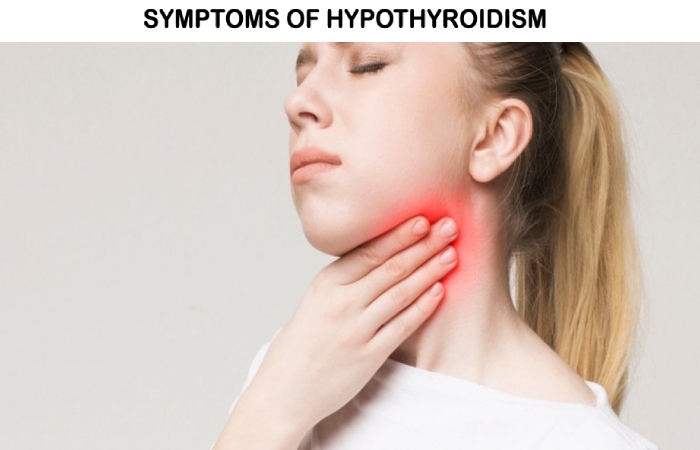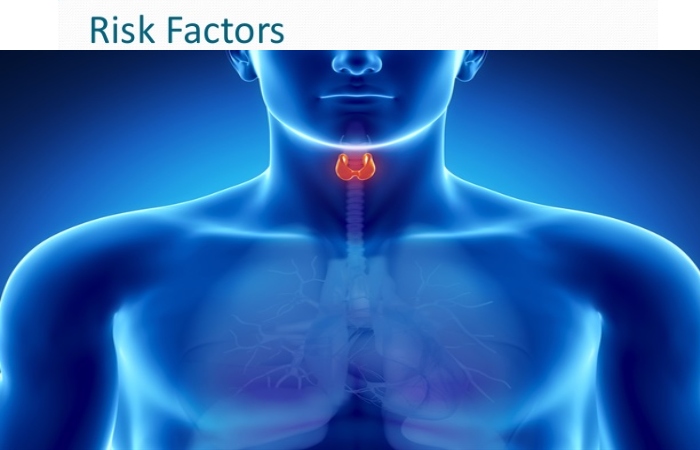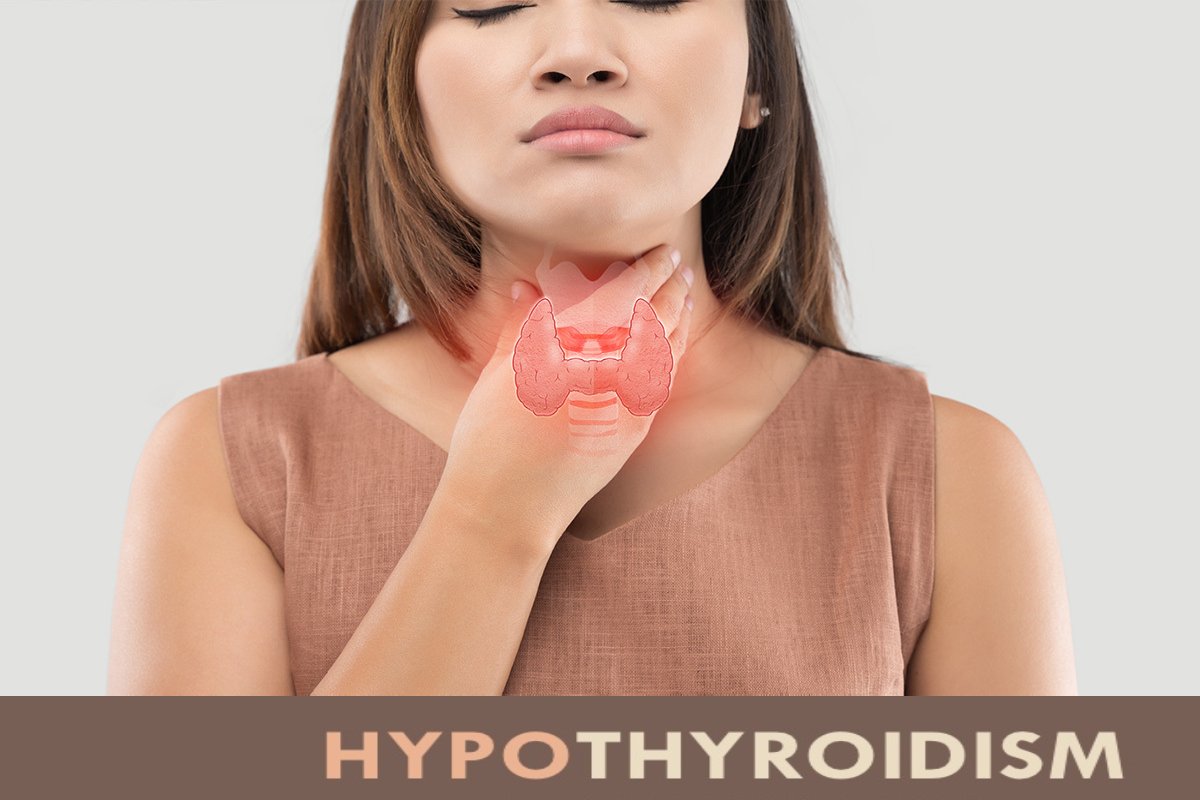Table of Contents
Hypothyroidism Definition
Hypothyroidism (underactive thyroid) is a disorder in which the thyroid gland does not produce certain crucial hormones.
It may not cause noticeable symptoms in the early stages. Over time, untreated hypothyroidism can cause numerous health problems, including obesity, joint pain, infertility, or heart disease.
There are accurate tests of thyroid function to diagnose hypothyroidism. Synthetic thyroid hormone treatment is generally straightforward, safe, and effective once you and your doctor find the correct dose for you.
Symptoms of Hypothyroidism

1. Thyroid Gland with Larynx and Trachea
The signs and symptoms of hypothyroidism vary, contingent on the severity of the hormone deficiency. Problems incline to develop slowly, often over several years.
At first, the symptoms of hypothyroidism are barely noticeable, such as tiredness or weight gain. Or you can attribute them to ageing. As your metabolism continues to slow down, problems may become more apparent.
Here are some symbols and symptoms of hypothyroidism:
- Fatigue;
- Increased sensitivity to cold;
- Constipation;
- Dry Skin;
- Weight gain;
- Swelling of the face;
- Hoarseness;
- Muscular weakness;
- Elevated blood cholesterol level;
- Muscle aches, tenderness, and stiffness;
- Joint pain, stiffness, or swelling;
- Irregular or heavier menstrual periods than usual;
- Hair thinning;
- Slow heart rate;
- Depression;
- Poor memory;
- Enlarged thyroid gland (goiter).
2. Infants with Hypothyroidism
Although hypothyroidism usually affects middle-aged and older women, anyone can develop the condition, even babies. Initially, babies born without a thyroid gland or with a gland that is not working correctly may have few signs and symptoms. When newborns have hypothyroid problems, some of them are as follows:
Yellowing of the casing and the whites of the eyes (jaundice). In most cases, this occurs when the baby’s liver cannot metabolize a substance called bilirubin, which usually forms when the body recycles old or damaged red blood cells.
- A large, prominent tongue.
- Difficulty breathing.
- Hoarse cry
- An umbilical hernia.
As the disease progresses, babies are more likely to have feeding problems and may not grow and develop normally. They may also have the following:
- Constipation
- Poor muscle tone
- Excessive drowsiness
- When hypothyroidism in babies not treat, even mild cases can lead to severe physical and mental retardation.
3. Hypothyroidism in Children and Adolescents
In general, children and adolescents with hypothyroidism have the same signs and symptoms as adults, but they may also have:
- Poor growth, resulting in short stature
- Delayed development of permanent teeth
- Late puberty
- Poor mental development
What are the Causes of Hypothyroidism?
When the thyroid does not crop enough hormones, the balance of chemical reactions in your body can be affected. There can be many causes, including autoimmune disease, hyperthyroidism treatments, radiation therapy, thyroid surgery, and certain medications.
The thyroid is a minor, butterfly-shaped gland located at the base of the front of the neck, just below Adam’s apple. The hormones produced by the thyroid gland, triiodothyronine (T3) and thyroxine (T4), significantly impact your health and affect all aspects of your metabolism.
These hormones also influence the control of vital functions, such as body temperature and heart rate. Hypothyroidism occurs when the thyroid gland does not produce enough hormones. Many factors, including: can cause hypothyroidism.
1. Autoimmune Disease
- The most shared cause of hypothyroidism is an autoimmune disorder known as Hashimoto’s thyroiditis.
- Autoimmune diseases occur when the immune system produces antibodies that attack your tissues.
- Sometimes this process involves the thyroid gland.
- Scientists aren’t sure why this occurs, but it’s probably a combination of factors, such as genes and an environmental trigger.
- Either way, these antibodies affect the thyroid’s ability to make hormones.
2. Response to Treatment for Hyperthyroidism
- People who make too much thyroid hormone (hyperthyroidism) often treated with radioactive iodine or antithyroid drugs.
- The goal of these treatments is to normalize thyroid function. However, sometimes correcting hyperthyroidism can reduce thyroid hormone production too much, leading to permanent hypothyroidism.
3. Thyroid Surgery
- Removing all or most of the thyroid gland can slow or stop the production of hormones. In that case, you will need to take thyroid hormone for life.
4. Radiotherapy
- Radiation used to treat head and neck cancer can affect the thyroid gland and lead to hypothyroidism.
5. Medicines
- There are a large number of medications that can contribute to the development of hypothyroidism. One of them is lithium, which uses to treat certain psychiatric disorders. If you take any medicines, ask your specialist about their effects on the thyroid gland.
Risk Factors of Hypothyroidism

While anyone can get hypothyroidism, you are at higher risk if you have these factors:
- If you are a woman
- If you are over 60 years old
- You have a family past of thyroid disease
- And also, you have an autoimmune disease, such as type 1 diabetes or celiac disease.
- Treat with radioactive iodine or antithyroid drugs.
- You received radiation therapy to your neck or upper chest.
- Had thyroid surgery (partial thyroidectomy)
- And also, you were pregnant or gave birth in the last six months.
Complications of Hypothyroidism
Untreated hypothyroidism can lead central to several health problems:
Goiter: The continuous stimulation of the thyroid to release more hormones can cause the gland to enlarge; This disorder is known as goiter. Although generally not uncomfortable, an enormous goiter can affect your appearance and interfere with swallowing or breathing.
Heart Problems: Hypothyroidism may also be linked to an increased risk of heart disease and heart failure, primarily because high levels of low-density lipoprotein (LDL cholesterol), the “bad” cholesterol, can occur in people with an underactive thyroid.
Mental Health Problems: At the onset of hypothyroidism, depression may be present and may worsen over time. Hypothyroidism can also slow down mental functioning.
Peripheral Neuropathy: Long-term uncontrolled hypothyroidism can cause peripheral nerve damage. These are the nerves that carry info from the brain and spinal cord to the rest of the body, such as arms and legs. Peripheral neuropathy can cause pain, numbness, and tingling in the affected areas.
Myxedema: This rare and life-threatening disorder occurs as a result of long-term undiagnosed hypothyroidism. Signs and symptoms of myxedema include severe cold intolerance and drowsiness followed by profound lethargy and loss of consciousness.
Hypothyroid coma can trigger by sedatives, infections, or other stresses on the body. If you have signs or indications of myxedema, you need immediate emergency medical treatment.
Infertility: Low thyroid hormone levels can interfere with ovulation, affecting fertility. Additionally, some causes of hypothyroidism, such as autoimmune disorders, can also affect fertility.
Congenital Anomalies: Babies born to women with untreated thyroid disease may be at higher risk of being born with genetic disabilities than babies born to healthy women. In turn, these children are more likely to have severe intellectual and developmental problems.
Diagnosis of Hypothyroidism
- In general, your doctor can test for an underactive thyroid if you feel overly tired, have dry skin, constipation, and weight gain, or if you’ve had previous thyroid problems or goiter.
- The diagnosis of hypothyroidism makes based on symptoms and the results of blood tests that measure the level of TSH and sometimes the story of another thyroid hormone called thyroxine.
- A low thyroxine level and a high TSH level indicate that the thyroid is underactive. This is because the pituitary gland crops more TSH to stimulate the thyroid gland to produce more thyroid hormone.
- Doctors can diagnose thyroid disorders much earlier than they did long ago, usually before you experience symptoms.
- Since the TSH test is the best screening test, your doctor will probably check your TSH first and then perform a thyroid hormone test, if necessary.
- TSH tests are also essential in managing hypothyroidism. They help your doctor determine the proper dose of medication, both initially and over time.
- Additionally, TSH tests diagnose a disorder known as subclinical hypothyroidism, which usually does not cause noticeable signs or symptoms.
- In people with this condition, blood levels of triiodothyronine and thyroxine are normal, but TSH levels are slightly higher than usual.
- Certain factors can affect blood tests for thyroid problems. One is the blood-thinning medicine called heparin.
- Another is biotin, a vitamin taken as a stand-alone supplement or as part of multivitamin supplements. Inform your doctor of any medications or complements you take before taking the blood test.
Treatment of Hypothyroidism

The usual treatment for hypothyroidism involves the daily use of the synthetic thyroid hormone levothyroxine (Levothroid, Synthroid, among others). This oral medication restores proper hormone levels and reverses the signs and symptoms of hypothyroidism.
You will likely start to feel healthier within a few days of starting treatment. The medicine gradually lowers cholesterol levels raised by the disease and can reverse weight gain. Treatment with levothyroxine is generally lifelong, but since the dose you need changes, your doctor may monitor your TSH level each year.
1. Determining the Proper Dosage can Take a While
Initially, to determine the proper dose of levothyroxine, your doctor usually checks your TSH level after six to eight weeks. After that, blood levels typically contain six months later. An excessive amount of hormones can cause side effects, for example:
- Increased appetite
- Insomnia
- Palpitations
- Tremors
If you have severe coronary artery disease or hypothyroidism, your doctor may start treatment with a small amount of medication and then gradually increase the dose. Progressive hormone replacement allows your heart to adapt to the increased metabolism.
Levothyroxine causes virtually no side effects when used in the proper dosage and costs relatively little money. If you switch brands, let your doctor know to make sure you get the appropriate dose.
Also, do not skip doses or stop taking the medication just because you feel better. If you do that, the symptoms of hypothyroidism will gradually return.
2. Appropriate Absorption of Levothyroxine
Some medications, supplements, and even some foods can affect your ability to absorb levothyroxine. Talk to your doctor if you consume large amounts of soy products, if you are on a high-fibre diet, or if you take other medications, such as:
- Iron supplements or multivitamins that contain iron.
- Aluminium hydroxide, which is present in some antacids.
- Calcium supplements.
- Levothyroxine is best taken on an empty stomach at the same time each day. Ideally, take the hormone in the morning and wait an hour before eating or taking other medications.
- If you take it at bedtime, you must wait four hours after the last meal or snack.
- If your failed an amount of levothyroxine, you should take two pills the next day.
3. Subclinical Hypothyroidism
- If you have subclinical hypothyroidism, discuss your treatment with your doctor.
- In the event of a relatively mild increase in thyrotropin (TSH), thyroid hormone treatment may not benefit you and may even be harmful.
- On the other hand, when the TSH level is higher, the thyroid hormone can improve your cholesterol and energy levels and your heart’s pumping capacity.
When to See the Doctor
See your doctor if you feel tired for no reason or have other signs and symptoms of hypothyroidism, such as dry skin, swollen and pale face, constipation, or a hoarse voice.
Suppose you are receiving hormone therapy for hypothyroidism. Schedule follow-up visits as frequently as your doctor recommends. In the beginning, you must make certain that you are receiving the correct dose of medication. Also, over time the amount you need may change.
Conclusion
Hypothyroidism (underactive thyroid) is a disorder in which your thyroid gland doesn’t produce certain crucial hormones. Hypothyroidism may not cause noticeable symptoms in the early stages.

